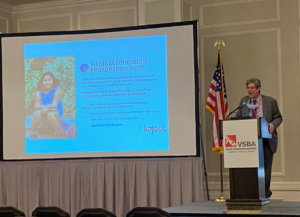VSTE partners with Big Deal Media to bring you carefully curated resources designed for K-12 educators. Grants, competitions, web-based and mobile resources and more. We select our favorites from each newsletter but be sure to scroll down and view the whole newsletter. And, since not all the Big Deal Book resources are time sensitive, we provide an archive for you to browse.
This newsletter will help you with Encouraging Gratefulness, Fueling Interest in STEM Careers & More...
Virtual Painting and Drawing Tools for Digital Artists
Child-Friendly Social–Emotional Video Series
View the whole Big Book Deal Newsletter for December 1, 2022


 Boolean Girl is a non-profit with a mission to diversify technology fields by teaching girls and individuals from underrepresented groups to code, build, invent, and animate.
Boolean Girl is a non-profit with a mission to diversify technology fields by teaching girls and individuals from underrepresented groups to code, build, invent, and animate.


